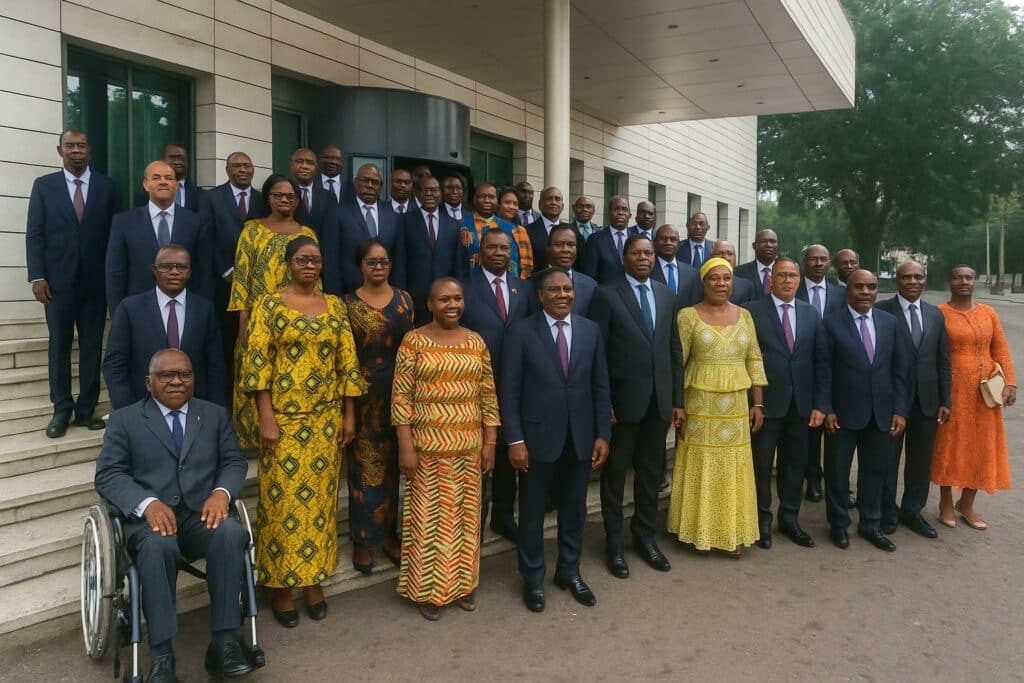A ceremonial launch under high institutional auspices
From 30 to 31 October 2025 the marble halls of the Palais des Congrès in Brazzaville hosted the inaugural and first ordinary sessions of the Economic, Social and Environmental Council, marking the formal beginning of the 2025-2029 mandate. The newly appointed councillors – invested by presidential decree n° 2025-173 of 13 May 2025 – took their seats under the gavel of Madam Émilienne Raoul, whose renewed presidency symbolises institutional continuity. Prime Minister Anatole Collinet Makosso, representing President Denis Sassou Nguesso, delivered the opening address before an audience that included cabinet members, parliamentarians and representatives of civil society.
The ceremony, replete with the solemnities reserved for the Republic’s consultative bodies, reaffirmed the Council’s constitutional vocation as a permanent forum for social dialogue. The presence of the head of government lent political weight to the proceedings and underscored the executive’s intention to rely on the CESE as a privileged source of expertise for public policy.
Prime Minister calls for an era of reinforced consultation
In a speech combining measured optimism and pragmatic urgency, Prime Minister Makosso described the Council as “the custodian of a model of social cohesion” and emphasised that its advisory opinions must help keep the thread of dialogue intact even in times of adversity. Congratulating Madam Raoul on her reconfirmation – a gesture he framed as recognition of women’s leadership in public governance – he urged the 2025-2029 cohort to cultivate close working relations with the other institutions of the Republic.
Echoing concerns over global economic headwinds and environmental disruptions, the Prime Minister encouraged the advisers to orient their deliberations toward climate justice, human development, good governance and the reduction of inequalities. In his view, the magnitude of current challenges obliges “the association of all intelligences”, a formulation that positions the CESE as both counsellor and catalyst for inclusive growth.
Émilienne Raoul outlines a roadmap for inclusive governance
Responding from the rostrum, Madam Raoul voiced gratitude for the renewed confidence placed in her by the head of state while sketching the thematic contours of the new term. She pointed to unchecked urban expansion, environmental preservation and the demand for a fairer economic model as pressing files on which the Council must render authoritative opinions. With candour, she deplored the decline in female representation within the assembly and appealed for greater youth involvement in decision-making processes.
Her message was at once programmatic and exhortatory: the CESE, she insisted, must initiate “a sincere dialogue” with line ministries so that its recommendations translate into concrete public measures. To that end she called for multifaceted governmental support, notably in the financing of studies and the broader dissemination of the Council’s work.
Normative foundations updated for the 2025-2029 term
Much of the two-day sitting was devoted to the meticulous examination of internal rules. After line-by-line deliberation, the plenary adopted both the revised Rules of Procedure and the Financial Regulations that will govern the institution over the next four years. These instruments constitute the legal and administrative backbone of the CESE, clarifying prerogatives, budgetary discipline and ethical standards.
By tightening these normative screws at the outset, the Council signalled its commitment to transparency and accountability—principles highlighted by several speakers as indispensable to public trust.
Four standing committees for specialised expertise
The session proceeded with the installation of four permanent committees: Economic Affairs; Social Affairs; Educational, Cultural and Religious Affairs; and Environmental Affairs. This architecture, inherited from previous mandates but now refined, is designed to foster thematic depth and accelerate the production of consultative opinions.
Each committee is tasked with drawing on academic research, field consultations and comparative experiences to inform its deliberations. The expectation, articulated by both the Prime Minister and the Chair, is that such specialisation will enhance the operational efficiency of the Council and ensure that its advice remains both timely and empirically grounded.
Anchoring national ambitions in a turbulent global context
Speakers throughout the conclave repeatedly situated Congo-Brazzaville’s domestic agenda within a wider international landscape characterised by economic volatility and ecological stress. For the Council, the implication is two-fold: first, that national policies must be resilient enough to absorb external shocks; second, that the Republic can showcase constructive solutions, notably in the fields of sustainable resource management and social protection.
The Prime Minister’s insistence on concertation, coupled with the Chair’s appeal for youth and gender inclusivity, suggests an institutional strategy centred on participatory governance. In that perspective the CESE aims to become not merely an advisory chamber but a laboratory where the contours of a more equitable development model can emerge.
A forward-looking closing note
The proceedings culminated in the adoption of a final communiqué and a closing statement in which Madam Raoul saluted the quality of debate and the sense of responsibility shown by members. She expressed appreciation for the government’s logistical and political backing, urging councillors to turn the Council into an effective decision-support tool and a vector of national cohesion.
With its dual inaugural and ordinary character, the 30-31 October session has set a deliberate tone: the Economic, Social and Environmental Council intends to serve as a pillar of social dialogue and sustainable development for Congo-Brazzaville. The roadmap unveiled in Brazzaville foreshadows four years of concerted reflection aimed at reinforcing the fabric of the Republic’s participatory democracy and at guiding public action toward balanced, inclusive and environmentally attentive growth.

